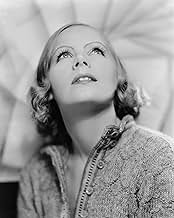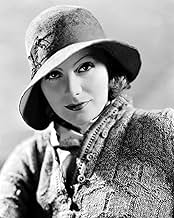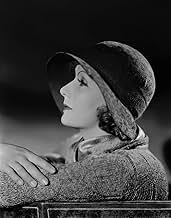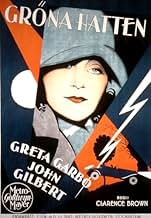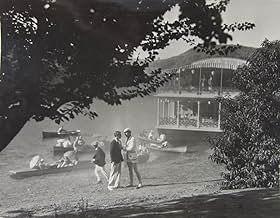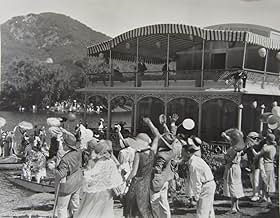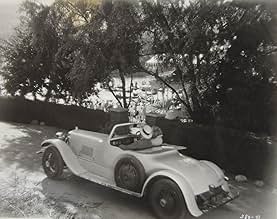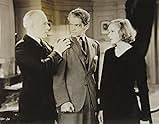AVALIAÇÃO DA IMDb
7,1/10
1,8 mil
SUA AVALIAÇÃO
Adicionar um enredo no seu idiomaWhen two childhood sweethearts are kept from marrying, misery ensues.When two childhood sweethearts are kept from marrying, misery ensues.When two childhood sweethearts are kept from marrying, misery ensues.
- Direção
- Roteiristas
- Artistas
- Indicado a 1 Oscar
- 2 vitórias e 1 indicação no total
Johnny Mack Brown
- David Furness
- (as John Mack Brown)
Gertrude Astor
- Party Guest
- (não creditado)
Agostino Borgato
- French Police Inspector
- (não creditado)
F.F. Guenste
- Servant at Davids Death Investigation
- (não creditado)
Sydney Jarvis
- Gendarme
- (não creditado)
Fred Kelsey
- Detective
- (não creditado)
Anita Louise
- Diana - as a Child
- (não creditado)
Alphonse Martell
- French Hotel Concierge
- (não creditado)
William H. O'Brien
- Man Peering Into Room
- (não creditado)
Frank Finch Smiles
- Butler
- (não creditado)
Avaliações em destaque
A WOMAN OF AFFAIRS (MGM, 1928), directed by Clarence Brown, from the then controversial novel, "The Green Hat" by Michael Arlen, reunites then popular love team of John Gilbert and Greta Garbo in their third collaboration on screen. Initially teamed under Clarence Brown's direction in the highly popular FLESH AND THE DEVIL (1926), followed by LOVE (1927), taken from the Leo Tolstoy's classic novel, "Anna Karenina," Gilbert and Garbo once more star in a silent melodrama about love and tragedy. Unlike their earlier screen efforts, their characters in this story are already acquainted since childhood, leaving no chance of meeting and falling in love, but the difference here is that their relationship is interfered by a third party who happens not to be another lover or spouse. And unlike their earlier two films, Garbo is more the central focus here than Gilbert.
The story begins quite amusingly, finding the wild and merry Diana Merrick (Greta Garbo) driving recklessly down the road in the Mack Sennett Keystone comedy fashion, nearly missing the ditch diggers as she drives over them. Moments later, the characters in the story, the Holderness and the Merricks, are introduced with each passing scene. Diane is a carefree woman who has loved Neville Holderness (John Gilbert) since childhood. She has a brother, Jeffry (Douglas Fairbanks Jr.), a pampered youth who's so bored with his life that his only satisfaction is boozing up with liquor. Jeffry's closest friend, David Furness (Johnny Mack Brown), tries to stop him from his wild and wicked ways, but to no avail. Neville's father, Sir Morton (Hobart Bosworth), disapproves of the Merrick family's way of life. When he learns that his son wants to marry Diana, he manages to send Neville away to Egypt for a few years, in hope that the two will forget one another through the passage of time. Two years later, Diana marries David. On their wedding night, detectives (one of them played by character actor Fred Kelsey) enter their honeymoon suite in France to arrest David on the charges of theft. Before he can be arrested, David ends his life by jumping out the window. To keep David's name clear for decency sake, she secretly sets out to repay the victims of David's past crimes, a deed only known to the family physician, Doctor Hugh Trevelyan (Lewis Stone). Over the next few years, Diana makes the gossip columns as being a widow of many love affairs throughout the world. As for Neville, he becomes engaged to marry a nice young girl named Constance (Dorothy Sebastian), whom, as Diana describes through the title cards, as a girl "whose eyes are so true and clean." But Old Man Holderness, knowing how his son and Diana still feel about one other, continues to keep the scandalous Diana away his son, causing Neville to become like Jeffry, an unbearable alcoholic.
While not as famous by today's standards as FLESH AND THE DEVIL, A WOMAN OF AFFAIRS somewhat predates those "Peyton Place"-type soap-operas or Lana Turner melodramas quite popular during the 1950s and 60s. It also shows that aristocratic families may have all the luxuries that money can buy, but money does not always buy happiness. Douglas Fairbanks Jr.'s portrayal as an unhappy youth who turns to drink, is quite believable, especially when his glassy eyes, uncombed hair almost covering a portion of his eye, with whiskey glass in his hand that at times has him resemble a young John Barrymore. Whether this was intentional or not will never be known. Fairbanks, however, does well with his early screen performance.
Clarence Brown's direction with the Gilbert-Garbo loves scenes do have some bonuses, but are not as "hot" as in FLESH AND THE DEVIL. One scene that stands out is finding Diana, wearing a special ring on her finger, making love to Neville on the couch, with Diana telling him, "I would only take it off for the man I love." The camera then pans down to her hand just as the ring slowly slips off her finger. As for the story itself, it takes place during a span of ten years, yet the characters in the plot don't look any different in the conclusion as they appear in the opening, making the storyline look more as if it takes place in a span of ten months than ten years. The costumes and hairstyles are obviously modern late 1920s, which works out better in the latter portion of the story than the early segments, circa 1918. And although Garbo has that special beauty, especially when properly photographed, she doesn't look particularly attractive in some of those costumes designed for her, mainly when wearing those flapper-designed hats. Essentially a silent movie that was initially distributed in theaters with recorded scoring, one wishes such a score for this film have been used for its current video distribution, which comes with a Thames stereo orchestral soundtrack. The stereo score has its moments, but when it comes to its slow tempo violin playing in some segments of the story, it becomes a real sleep inducer. A WOMAN OF AFFAIRS was remade by MGM in 1934 as OUTCAST LADY starring Constance Bennett and Herbert Marshall. Both versions are available for viewing on cable TV's Turner Classic Movies.
One final note: A WOMAN OF AFFAIRS was one of the 13 feature films presented on the public television series, MOVIES, GREAT MOVIES (Original air date: October 26, 1973), a 50th anniversary tribute to Metro-Goldwyn-Mayer of the silent era, as hosted by Richard Schickel, on WNET, Channel 13, in New York City. Clocked then at 109 minutes, the TCM print differs in scoring and length, either at 98 (Thames) or 91 minutes. (***)
The story begins quite amusingly, finding the wild and merry Diana Merrick (Greta Garbo) driving recklessly down the road in the Mack Sennett Keystone comedy fashion, nearly missing the ditch diggers as she drives over them. Moments later, the characters in the story, the Holderness and the Merricks, are introduced with each passing scene. Diane is a carefree woman who has loved Neville Holderness (John Gilbert) since childhood. She has a brother, Jeffry (Douglas Fairbanks Jr.), a pampered youth who's so bored with his life that his only satisfaction is boozing up with liquor. Jeffry's closest friend, David Furness (Johnny Mack Brown), tries to stop him from his wild and wicked ways, but to no avail. Neville's father, Sir Morton (Hobart Bosworth), disapproves of the Merrick family's way of life. When he learns that his son wants to marry Diana, he manages to send Neville away to Egypt for a few years, in hope that the two will forget one another through the passage of time. Two years later, Diana marries David. On their wedding night, detectives (one of them played by character actor Fred Kelsey) enter their honeymoon suite in France to arrest David on the charges of theft. Before he can be arrested, David ends his life by jumping out the window. To keep David's name clear for decency sake, she secretly sets out to repay the victims of David's past crimes, a deed only known to the family physician, Doctor Hugh Trevelyan (Lewis Stone). Over the next few years, Diana makes the gossip columns as being a widow of many love affairs throughout the world. As for Neville, he becomes engaged to marry a nice young girl named Constance (Dorothy Sebastian), whom, as Diana describes through the title cards, as a girl "whose eyes are so true and clean." But Old Man Holderness, knowing how his son and Diana still feel about one other, continues to keep the scandalous Diana away his son, causing Neville to become like Jeffry, an unbearable alcoholic.
While not as famous by today's standards as FLESH AND THE DEVIL, A WOMAN OF AFFAIRS somewhat predates those "Peyton Place"-type soap-operas or Lana Turner melodramas quite popular during the 1950s and 60s. It also shows that aristocratic families may have all the luxuries that money can buy, but money does not always buy happiness. Douglas Fairbanks Jr.'s portrayal as an unhappy youth who turns to drink, is quite believable, especially when his glassy eyes, uncombed hair almost covering a portion of his eye, with whiskey glass in his hand that at times has him resemble a young John Barrymore. Whether this was intentional or not will never be known. Fairbanks, however, does well with his early screen performance.
Clarence Brown's direction with the Gilbert-Garbo loves scenes do have some bonuses, but are not as "hot" as in FLESH AND THE DEVIL. One scene that stands out is finding Diana, wearing a special ring on her finger, making love to Neville on the couch, with Diana telling him, "I would only take it off for the man I love." The camera then pans down to her hand just as the ring slowly slips off her finger. As for the story itself, it takes place during a span of ten years, yet the characters in the plot don't look any different in the conclusion as they appear in the opening, making the storyline look more as if it takes place in a span of ten months than ten years. The costumes and hairstyles are obviously modern late 1920s, which works out better in the latter portion of the story than the early segments, circa 1918. And although Garbo has that special beauty, especially when properly photographed, she doesn't look particularly attractive in some of those costumes designed for her, mainly when wearing those flapper-designed hats. Essentially a silent movie that was initially distributed in theaters with recorded scoring, one wishes such a score for this film have been used for its current video distribution, which comes with a Thames stereo orchestral soundtrack. The stereo score has its moments, but when it comes to its slow tempo violin playing in some segments of the story, it becomes a real sleep inducer. A WOMAN OF AFFAIRS was remade by MGM in 1934 as OUTCAST LADY starring Constance Bennett and Herbert Marshall. Both versions are available for viewing on cable TV's Turner Classic Movies.
One final note: A WOMAN OF AFFAIRS was one of the 13 feature films presented on the public television series, MOVIES, GREAT MOVIES (Original air date: October 26, 1973), a 50th anniversary tribute to Metro-Goldwyn-Mayer of the silent era, as hosted by Richard Schickel, on WNET, Channel 13, in New York City. Clocked then at 109 minutes, the TCM print differs in scoring and length, either at 98 (Thames) or 91 minutes. (***)
Adapted from the novel "The Green Hat", I would have retitled it "Two Gallant Ladies and The Men Who Messed Everything Up". However, even that doesn't do it justice. This is almost a feminist film. Garbo is one of the two of the last "Mad Merricks", not much more is said about the family name except that Diana is independently wealthy and somewhat reckless. In the opening scene she is driving her car wildly through the countryside with her first and only true love, Neville Holderness (John Gilbert), as a passenger. They have been in love since childhood and want to marry. However, Neville's dad, Sir Morton, does not want this marriage. No valid reason is given other than perhaps he does not want the pitter patter of little mad Merricks to end up being his heirs.
Neville has no money in his own name, so his dad uses this fact to get Neville to agree to take a job in Egypt, before he marries Diana, so that he can earn some money and start a career. Dad just wants to separate the pair on the hope that they will forget about one another. Diana sees through the ruse, and Neville doesn't even bother to say a last goodbye -again, dad's idea. Complications, heartache, and tragedy ensue.
The reason I say this is almost a feminist film is because the only two women in the film - Diana and Constance (Dorothy Sebastian) are the only virtuous people in the entire cast. Hugh (Lewis Stone), long time family friend of the Merricks, comes close, but near the end breaks a trust in doing what he thinks is a good deed. Jeffry, Diana's brother, is an alcoholic, Neville is ultimately a coward, his dad is a snob, and David Furness, who has always loved Diana and been Jeffry's hero since childhood, has his problems too. Problems so bad that Diana ruins her reputation in order to keep them secret so that the image that her brother Jeffry has of him can stay intact. In this way, she is a gallant lady. As for Constance, she is the girl of whom Neville's dad approves, so Neville marries her like the obedient son that he is. However, Constance is wise. She can see Neville and Diana are still in love, and does not blame either of them for something they cannot help. Thus she is also a gallant lady.
I'll let you watch and see how this all works out. I think it is Garbo's best silent film. She gives a strong performance in a film with a good plot and a good cast surrounding her, and as always, her chemistry with Gilbert is wonderful. Highly recommended.
Neville has no money in his own name, so his dad uses this fact to get Neville to agree to take a job in Egypt, before he marries Diana, so that he can earn some money and start a career. Dad just wants to separate the pair on the hope that they will forget about one another. Diana sees through the ruse, and Neville doesn't even bother to say a last goodbye -again, dad's idea. Complications, heartache, and tragedy ensue.
The reason I say this is almost a feminist film is because the only two women in the film - Diana and Constance (Dorothy Sebastian) are the only virtuous people in the entire cast. Hugh (Lewis Stone), long time family friend of the Merricks, comes close, but near the end breaks a trust in doing what he thinks is a good deed. Jeffry, Diana's brother, is an alcoholic, Neville is ultimately a coward, his dad is a snob, and David Furness, who has always loved Diana and been Jeffry's hero since childhood, has his problems too. Problems so bad that Diana ruins her reputation in order to keep them secret so that the image that her brother Jeffry has of him can stay intact. In this way, she is a gallant lady. As for Constance, she is the girl of whom Neville's dad approves, so Neville marries her like the obedient son that he is. However, Constance is wise. She can see Neville and Diana are still in love, and does not blame either of them for something they cannot help. Thus she is also a gallant lady.
I'll let you watch and see how this all works out. I think it is Garbo's best silent film. She gives a strong performance in a film with a good plot and a good cast surrounding her, and as always, her chemistry with Gilbert is wonderful. Highly recommended.
Greta garbo's career spanned the 1920s (silents) and 1930s (talkies). This one came about halfway through, just before the switch to talkies. And because it's a silent, you are forced to really pay attention. Featuring garbo and gilbert, the huge stars of the day. Co-stars a couple more big names.. doug fairbanks and lewis stone. Diana and neville want to be married, but his father wants to prevent it from happening. High drama, in spite of the fact that it's been toned way down from the original story. This started life as a novel, then a play, and later this film! According to the trivia section, because the original story had so many taboo elements, it was all changed around to get past the censors. Interesting, since so many of the production code rules didn't really get enforced until the early 1930s. It's a good film, in spite of all the changes. It was even nominated for best writing. And that's an accomplishment, since the story had been so altered. Directed by clarence brown. And pretty amazing picture quality, since this is coming up on 100 years old. Must have been a good restoration. Never miss a greta garbo film!
I'd seen the remake Outcast Lady before I rented the original silent version A Woman of Affairs. In both stories, the plot is heavily censored from the novel, but if you don't know what's been cut it still seems entertaining and complex.
In this cast, Greta Garbo is in love with her childhood friend, John Gilbert, but his father doesn't approve. When he sends his son away for a years-long business trip, Greta retaliates by marrying her brother's best friend, Johnny Mack Brown. On their wedding night, Johnny gets upset and commits suicide, but since Greta refuses to tell anyone why he was so upset, everyone assumes it was her fault. Her brother, Douglas Fairbanks, Jr., in particular, blames her and accuses her of confessing sinful secrets to Johnny that made him rather die than face a life with her. Greta is banished, and Doug Jr. drinks to drown his sorrows. Only one man continually stands up for her, her pal Lewis Stone, who might harbor more than friendship in his heart.
In both versions, the woman's character doesn't really make sense. You can get past her marrying a man she doesn't love because she believes the man she does love has forgotten her, but accepting a banishment and terrible reputation when a simple explanation could have cleared things up doesn't make much sense. And after such a terrible scandal, for which she is blamed, it hardly makes sense to turn into a hussy. Why is that the answer to her problems? The rest of it is a good old-fashioned melodrama, so if you like soapy plots like that, you'll probably like to see one of the versions. Having seen both, I actually prefer the silent movie to the talkie. The story is simple and doesn't need a lot of dialogue, and since it's so over-the-top, it makes sense to have over-the-top acting to go along with it.
In this cast, Greta Garbo is in love with her childhood friend, John Gilbert, but his father doesn't approve. When he sends his son away for a years-long business trip, Greta retaliates by marrying her brother's best friend, Johnny Mack Brown. On their wedding night, Johnny gets upset and commits suicide, but since Greta refuses to tell anyone why he was so upset, everyone assumes it was her fault. Her brother, Douglas Fairbanks, Jr., in particular, blames her and accuses her of confessing sinful secrets to Johnny that made him rather die than face a life with her. Greta is banished, and Doug Jr. drinks to drown his sorrows. Only one man continually stands up for her, her pal Lewis Stone, who might harbor more than friendship in his heart.
In both versions, the woman's character doesn't really make sense. You can get past her marrying a man she doesn't love because she believes the man she does love has forgotten her, but accepting a banishment and terrible reputation when a simple explanation could have cleared things up doesn't make much sense. And after such a terrible scandal, for which she is blamed, it hardly makes sense to turn into a hussy. Why is that the answer to her problems? The rest of it is a good old-fashioned melodrama, so if you like soapy plots like that, you'll probably like to see one of the versions. Having seen both, I actually prefer the silent movie to the talkie. The story is simple and doesn't need a lot of dialogue, and since it's so over-the-top, it makes sense to have over-the-top acting to go along with it.
Greta Garbo was the antithesis of the old fashioned, expressive silent movie actors of yesteryear. Instead of wildly moving her arms and gesturing her emotions with her total body, the Swedish actress expressed her characters' emotions by way of little hints of facial movements. A perfect example of her subtle acting expressions is seen in her third movie with actor and lover John Gilbert in December 1928's "A Woman of Affairs."
Movie critic David Denby described her acting style in the way she lowered her "head to look calculating or flutters her lips. Her face darkens with a slight tightening around the eyes and mouth; she registers a passing idea with a contraction of her brows or a drooping of her lids. Worlds turned on her movement."
"A Woman of Affairs" was another huge money-maker for MGM. The movie proved that Garbo was becoming a printing press of dollar bills for the studio. This was her fifth Hollywood film, and the adoring public continued to flock to movie houses nationwide to witness those slight yet profound expressions. As a contemporary reviewer penned in 1929, "She has glamour and fascination for both sexes which have never been equaled on the screen." Based on a 1925 play adapted from the 1924 best-selling but controversial novel The Green Hat, by Michael Arlen, "A Woman of Affairs" forced MGM to rework some the important details mentioned in both the novel and the play that included descriptions of syphilis, miscarriages and heroin use. The Will Hays Production Code frowned on those topics. The story, set in England, focuses on three childhood friends, Neville (John Gilbert), who falls for friend Diana (Garbo). An assignment to Egypt causes Neville to miss his opportunity to marry Diana, who ends up crossing the threshold with her other childhood friend, David (Johnny Mack Brown). During their honeymoon, David commits suicide for embezzlement. Setting off a soap opera-like drama is Diana's eye-popping discovery that Neville has returned to England several years later with a new-found love in Constance (Dorothy Jeffry).
Critics point out the movie's highlight occurs when Garbo is in the hospital nine months after she spent an evening over Neville's house. It's hinted she's had a miscarriage, which explains her passion to cradle a bundle of flowers. The sequence displays every emotion an actress can possibly show: from crying, to loving, to questioning, to a sense of loss and hope. Garbo informs the viewers all this simply by her facial expressions. Because of such a highly emotional sequence in the hospital, Garbo's clout with the studio was so valuable that MGM granted her the unusual request that visitors, including studio executives, be restricted from the set. The actress even asked black screens be built surrounding the area she was filming so extras and even technicians couldn't view her acting. Garbo defended her closed sets by explaining "If I am by myself, my face will do things I cannot do with it otherwise."
No one could argue about the results Garbo gave on the big screen. And the beancounters in the studio's accounting room stood by the actress's on-set demands after their offices were flooded with the receipts from the tremendous amount of tickets she sold under the MGM logo.
Movie critic David Denby described her acting style in the way she lowered her "head to look calculating or flutters her lips. Her face darkens with a slight tightening around the eyes and mouth; she registers a passing idea with a contraction of her brows or a drooping of her lids. Worlds turned on her movement."
"A Woman of Affairs" was another huge money-maker for MGM. The movie proved that Garbo was becoming a printing press of dollar bills for the studio. This was her fifth Hollywood film, and the adoring public continued to flock to movie houses nationwide to witness those slight yet profound expressions. As a contemporary reviewer penned in 1929, "She has glamour and fascination for both sexes which have never been equaled on the screen." Based on a 1925 play adapted from the 1924 best-selling but controversial novel The Green Hat, by Michael Arlen, "A Woman of Affairs" forced MGM to rework some the important details mentioned in both the novel and the play that included descriptions of syphilis, miscarriages and heroin use. The Will Hays Production Code frowned on those topics. The story, set in England, focuses on three childhood friends, Neville (John Gilbert), who falls for friend Diana (Garbo). An assignment to Egypt causes Neville to miss his opportunity to marry Diana, who ends up crossing the threshold with her other childhood friend, David (Johnny Mack Brown). During their honeymoon, David commits suicide for embezzlement. Setting off a soap opera-like drama is Diana's eye-popping discovery that Neville has returned to England several years later with a new-found love in Constance (Dorothy Jeffry).
Critics point out the movie's highlight occurs when Garbo is in the hospital nine months after she spent an evening over Neville's house. It's hinted she's had a miscarriage, which explains her passion to cradle a bundle of flowers. The sequence displays every emotion an actress can possibly show: from crying, to loving, to questioning, to a sense of loss and hope. Garbo informs the viewers all this simply by her facial expressions. Because of such a highly emotional sequence in the hospital, Garbo's clout with the studio was so valuable that MGM granted her the unusual request that visitors, including studio executives, be restricted from the set. The actress even asked black screens be built surrounding the area she was filming so extras and even technicians couldn't view her acting. Garbo defended her closed sets by explaining "If I am by myself, my face will do things I cannot do with it otherwise."
No one could argue about the results Garbo gave on the big screen. And the beancounters in the studio's accounting room stood by the actress's on-set demands after their offices were flooded with the receipts from the tremendous amount of tickets she sold under the MGM logo.
Você sabia?
- CuriosidadesMichael Arlen's 1924 novel was turned into a play of the same title, "The Green Hat." It opened on Broadway at the Broadhurst Theatre, 235 W. 44th St., on September 25, 1925 and ran for 231 performances.
- Erros de gravaçãoWhen Diana (as a child) rides her bike into the tree, the cut from the little girl (with short legs and her foot off the pedal) to the stunt-double (with long legs and her foot on the pedal) is obvious.
- Citações
Title Card: The widow of David Furness faced a questioning world. Why should a man - happy as David was - take his own life - - ?
- Versões alternativasMetro-Goldwyn-Mayer also released this picture as a totally silent movie.
- ConexõesFeatured in Será Pecado? (1951)
Principais escolhas
Faça login para avaliar e ver a lista de recomendações personalizadas
- How long is A Woman of Affairs?Fornecido pela Alexa
Detalhes
- Data de lançamento
- País de origem
- Idioma
- Também conhecido como
- Uma Mulher Singular
- Locações de filme
- Empresa de produção
- Consulte mais créditos da empresa na IMDbPro
Bilheteria
- Orçamento
- US$ 383.000 (estimativa)
- Tempo de duração
- 1 h 38 min(98 min)
- Cor
- Mixagem de som
- Proporção
- 1.33 : 1
Contribua para esta página
Sugerir uma alteração ou adicionar conteúdo ausente

